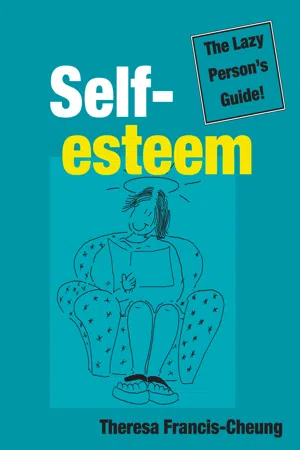![]()
CHAPTER 1
SELF-ESTEEM
Self-esteem is the way you think and feel about yourself. If you want to feel fulfilled, or to be comfortable in the company of others, self-esteem is crucial.
When you have self-esteem, ‘life is just a bowl of cherries’.
You believe you are an OK human being. You are comfortable with yourself. You feel attractive and vital. You have confidence, energy and optimism. You trust the world and the people around you. You generally have positive or realistic expectations. You take positive action to meet your needs and wants. You accept responsibility for your failures and your successes and are willing to take calculated risks. You feel equal to other people. You feel a sense of pride, satisfaction and happiness with your life. You see problems as challenges and opportunities to learn and improve. When you wake up in the morning it’s another day in paradise.
When self-esteem is low, ‘life is doubt’.
You doubt yourself and those around you. You lack confidence. Instead of taking action, you worry. You are uncertain about what your needs and wants are. You see problems as obstacles. You blame yourself for your failures and don’t take credit for your successes. You don’t believe there is anything you can do to change. You rarely feel happy. When you wake up in the morning it’s just another day you have to get through.
It doesn’t take a psychology degree to work out from these two lists which person stands a greater chance of happiness in life. When self-esteem is low, your chances of happiness are low.
If you have low-self esteem you aren’t being yourself, because you fear what others might think. You rely on others for approval. You don’t think you are worthwhile and you have little faith in your own abilities. If anything good happens to you it is just luck, while the success of others is due to ability. You may relate to others by being servile, submissive, passive or overbearing and a little needy. You feel guilty when you say no. You probably say, ‘sorry’, ‘yes, of course’, and ‘it’s only me’ quite a lot.
Sometimes self-doubt manifests in other ways. You may rely excessively on certain things for a feeling of self-worth. For instance, whether or not you feel good depends on your weight, your job, your finances, your home, your friends, or whether or not the man or woman of your dreams calls.
Or self-esteem may be high in one area of your life and low in others. You may feel confident at work and insecure in your relationships or vice versa. The trouble with this is that sooner or later lack of confidence in one area of your life is going to negatively affect other areas of your life. You need to feel relaxed and happy in all aspects of your life to function optimally.
And finally, your self-esteem could be good until something comes along, like losing a job or a relationship ending, to make you doubt yourself. Or pressures mount up in your life, and all of a sudden you feel doubtful, confused and frightened. At times even the most confident and happy among us feels insecure.
Whatever the cause, when self-esteem is low, the world you live in is a frightening and unpredictable one because you are always dependent on the whims of others or the turn of events. If you can compare your life to a car, when self-esteem is low you are not in the driving seat. Other people or events are steering the wheel, while you crouch in the back wondering where they will take you next. That’s exactly what low self-esteem does to your life. You are alive, but you aren’t really living.
WHAT SELF-ESTEEM ISN’T ABOUT
Our culture sets much store by self-esteem, as the shelves of self-help books on the subject prove. All too often we base our self-esteem on external factors such as looking good, having a partner, climbing the career ladder, gaining qualifications or having material possessions and wealth. All this is so fragile. Human beings age, lose jobs, fail in relationships, make mistakes and so on. The problem with self-esteem based on temporary externals is that you only feel good about yourself when things are going well, but when things don’t go so well, you lose your self-esteem.
To prevent this, self-esteem needs to be grounded firmly in self-acceptance. The concept of self-acceptance is based on the knowledge that we are all fallible human beings, we all make mistakes and nobody is perfect. So although you would like to be 100 per cent perfect all the time, the important thing is to learn to accept that sometimes you will be wrong and you are fallible.
Self-esteem without self-acceptance sets you up for disappointments, stress and unhappiness when misfortune arises and self-esteem is attacked. You need to learn to accept yourself, warts and all. One advantage of this is that it becomes easier to accept others and their fallibilities.
WHAT ABOUT THE MEEK INHERITING THE EARTH AND ALL THAT?
Many of us misunderstand religious doctrines about forgiveness, obedience and humility. They don’t mean becoming a doormat without opinions of your own or sacrificing your needs for those of others. They mean having the humility to recognise your weaknesses, respecting the opinions of others and working for the good of all concerned, including yourself.
High self-esteem isn’t the same as selfishly serving your own interests and having an inflated idea of your own self-worth. You can easily spot the difference between a person with a healthy sense of self-esteem and a person who is arrogant. The former looks relaxed and is keen to listen and learn. Such people tend to make others feel better about themselves. The latter is keen to boast, rarely listens and likes the sound of his or her own voice. Such people tend to make others feel worse about themselves.
Improving your self-esteem isn’t about becoming selfish, loud, competitive and arrogant. It’s about taking care of yourself so that you have the strength and energy to help and give to others when appropriate. It’s about being open-minded, assertive and confident in your abilities.
It’s about being yourself, and knowing that within you lies the power to create all that you want in life.
![]()
CHAPTER 2
DO YOU HAVE IT?
You probably know already if you feel good or bad about yourself, but in case there is any uncertainty, the quiz below will help you. It’s the only one in the book, so make the most of it.
On a scale of 1 to 10 how do you feel about yourself?
| 1 | = extremely dissatisfied |
| 2 | = very dissatisfied |
| 3 | = moderately dissatisfied |
| 4 | = somewhat dissatisfied |
| 5 | = there are some things you like about yourself, but some things you don’t |
| 6 | = okay |
| 7 | = somewhat satisfied |
| 8 | = moderately satisfied |
| 9 | = very satisfied |
| 10 | = brilliant |
If your answer was under 6, your self-esteem is fragile to dangerously low. This book may be all that you need to get you back on track, but if you feel persistently hopeless and anxious (answer either 2 or 1) you might benefit from seeking advice from a doctor or other professional, such as a counsellor, minister or therapist.
If your answer was between 7 and 9, you don’t really need this book, unless you are reading it to help someone else. If you answered 10, you are an inspiration to us all. Just be careful, though, that you don’t become a ‘big head’. Inflated self-esteem can be just as damaging as low self-esteem.
![]()
CHAPTER 3
WHY HAVEN’T YOU GOT IT?
Before moving on to self-help advice, let’s pause first and think about why you have problems with self-esteem. Self-awareness is the starting point for all confidence-building programmes. The big question is why some people feel good about themselves and see life as an exciting challenge and why others feel bad about themselves and see life as a frustrating struggle.
WHAT CAUSES LOW SELF-ESTEEM?
For centuries, psychologists, doctors, health experts, scientists, religious leaders, politicians and self-help gurus have tried to answer this question. But at the end of the day the answer is always the same: no-one is really quite sure. Several factors may contribute. (Key words and terms are in italics.)
It’s fashionable nowadays to blame mum and dad or your caregiver for everything. If bonding, the formation of a close personal relationship with parents, didn’t occur, or you didn’t form any kind of attachment, or emotional bond, with your caregivers, low self-esteem is likely. Bonding and attachment enhance self-worth because you experience feelings of being valued, which is an important factor in the development of a healthy self-esteem.
Approval, also known as acceptance and affirmation, is another crucial element in the development of your self-esteem. If you were accepted for who and what you are, without any preconceived ideas of what you should be or ought to do, of course you feel more secure than those who were constantly rejected, made to feel that they didn’t match up to expectations unless they behaved in a certain way, or, most destructive of all, abused physically or verbally.
Rejection may not come from within the home. Low self-esteem could start with harsh criticism, rejection, ridicule or abuse outside the home, most commonly in school. The disapproving comments of teachers or negative nicknames like ‘spotty’, ‘fatty’ or ‘four-eyes’ are common examples of rejection. They can have an injurious and lasting impact on our sense of self-worth.
Everyone wants to be popular and accepted. Rejection hurts whatever age you are. It is hard to feel good about yourself when you get a negative appraisal at work, fail an exam or your partner tells you that he or she doesn’t care about you anymore. All these things can injure self-esteem.
Genetics may hold a key to low self-esteem. People with low self-esteem often have parents or relatives who have problems asserting themselves. There is debate about whether this is inherited or learned. Children are born copycats. If you grew up seeing your parents always anxious and doubtful, you may not realise there are other ways to interact with the world.
Gender may also have a part to play. It is generally thought that women suffer from low self-esteem more than men, because of the conscious and unconscious indoctrination that men are somehow superior to women. Male superiority is, of course, a ridiculous notion, but traditional ideas of what it means to be a man and what it means to be a woman continue to linger on and do untold harm.
If men are indoctrinated to think that females are inferior, then so-called feminine qualities, like compassion, caring and sharing, may be repressed. And if women are brought up to believe that they are inferior, they may struggle with so-called masculine traits of strength, determ...

